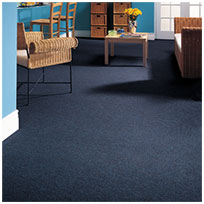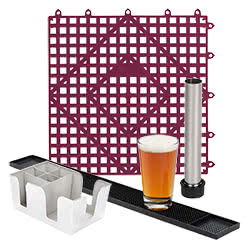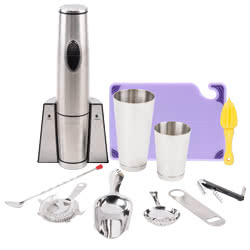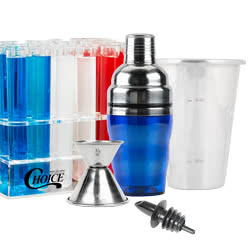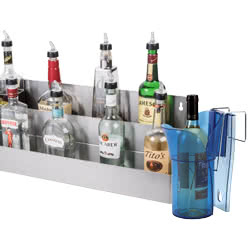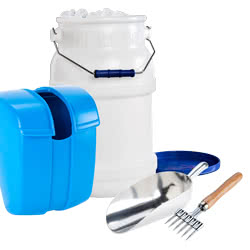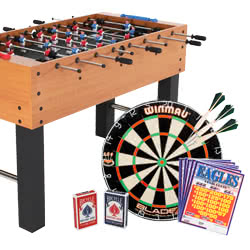Bar Organization and Sanitation Supplies
Keep your bar in order with these bar organization and sanitation supplies. You’ll find items like beer tap brushes, bottle racks, bar mats, and more.
Bartender Tools and Accessories
Our bartender tools and accessories include corkscrews and bottle openers. You’ll also find small cutting boards and special tools for garnishes.
Cocktail / Mixed Drink Supplies and Accessories
We have the cocktail and mixed drink supplies you need to make and serve drinks. Stock up on jiggers, pourers, shakers, and novelty drinkware.
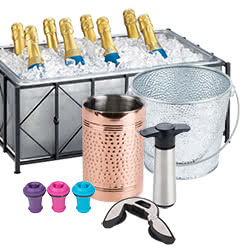
Bottle Service Supplies
Our bottle service supplies include tubs and pails that can be filled with ice to keep beverages chilled. You’ll even find buckets and coolers for wine.
6 Categories
Liquor and Wine Holders and Displays
Keep bottles accessible and organized with these liquor and wine holders and displays, such as speed rails, racks, and bottle holders.
Ice Supplies
These ice supplies include scoops and shovels for putting ice into transport buckets. Also, check out our rakes for breaking up large blocks of ice.
Bar Games
Increase sales with bar games. Playing cards, pull tab tickets, pool tables, air hockey tables, and dart boards encourage patrons to stay longer.
Other Smallwares
Whether you own a local bar in town or a large night club in a big city, we have the bartending supplies you need to maintain a successful business. From basic supplies, like cocktail shakers, liquor pourers, and utensils to larger storage racks, prep tools, and game room equipment, you’re sure to find the products you need. Upgrade your bar and draw in new customers by checking out our pub accessories, or browse our selection to simply restock your inventory. To complete your servingware supply, be sure to browse our melamine plates, flatware, and paper napkins. If you're wondering where to buy bartending supplies, we have a large selection of bartending supplies for sale at the lowest prices.

Bartending School Vs. Experience
For a thirsty customer, there's nothing worse than to order an Old Fashioned at the bar only to receive a glass of Irish whiskey with an orange in it. For a bar owner, the difference between success and failure often depends on the skill of their bartenders , and for bartenders, that skill is dependent on two things: workplace experience and / or education from a bartending school or class. No matter what kind of establishment you run, whether it's a dive bar or an upscale lounge, it can never hurt to have well-trained, professional bartenders on your staff. If they do their jobs right, they'll help save you money and ensure repeat customers, resulting in a successful, profitable business. But what's the best way to become a great bartender? Through formal bartender education, or by working your way up? Bartending School Although many professional bartenders never attend a bartending school, or have a bartending license, there are owners who prefer to hire graduates of bartending schools. While some bartenders and bar owners look down upon such establishments, there are benefits to hiring a somewhat inexperienced grad who hasn't already adapted bad bar habits such as overpouring, failing to upsell, and fixating on tips. For those looking to break into the business, bartending school offers several advantages: Ability to experiment at a mock well (without real liquor, though) No-pressure environment Learn around 150 standard recipes Feedback and instruction from real bartenders (usually) Additionally, many of the best bartending schools will offer helpful services to their students and graduates, such as: Workplace experience during coursework ServSafe Alcohol Training & Certification Additional classes on customer service and upselling Training for spotting and dealing with intoxicated patrons Resume writing and resource services Networking and job placement services How long is bartending school? Most courses last up to 40 hours split up over several days or we

How to Pour the Perfect Pint
How to Pour the Perfect Pint of Beer When it comes to the world of beer, knowing how to pour specific brews is essential to serving your guests the perfect pint. Whether you are pouring pilsners, stouts, IPAs, or Belgians, proper technique will maximize flavor, aroma, and mouthfeel while also producing the appropriate amount of head and releasing carbonation. Teaching your bartenders to properly pour a beer is crucial to the success of any bar, restaurant, brewery, or taphouse, especially as craft beer becomes more and more popular around the country. This step-by-step video and guide will show you how to pour beer from a regular tap, nitro tap, or bottle. Step-by-Step Instructions How to Pour a Draft Beer Draft beers are typically brewed with high levels of added carbon dioxide. During the brewing process, the keg is filled with CO2 to push beer through the tap and maintain carbonation when served. As a result, draft beers feature large bubbles and thin head. Carbon dioxide amounts in draft beers must be carefully monitored in order to keep the brew from becoming flat or overly foamy. Examples of draft beers are IPAs, lagers, and wheat beers. 1. Begin by rinsing your glass to remove any remaining detergents or residues. Doing so also helps with head retention. 2. Hold your glass at a 45 degree angle and begin pouring. Pour until the glass is around half full. 3. Hold the glass at a 90 degree angle (upright) and finish your pour. 4. Stop pouring right before the beer level reaches the top of the glass to leave room for around a half an inch of head. 5. Allow the beer to settle and the head to foam up. How to Pour a Nitro Beer Nitro beers draw their name from the incorporation of nitrogen during the brewing process. Unlike their draft counterparts, nitros contain around 70 percent nitrogen and 30 percent carbon dioxide. Because nitrogen is insoluble in liquid, the head and mouthfeel of nitro beers is rich, thick, and creamy. The addition of nitrogen also creates smal

How to Hire a Bartender
Hiring an experienced and skilled bartender is central to running a successful bar . If you're looking to hire a new bartender for your establishment, there are a number of important factors to consider before making your final decision. From evaluating work history and asking the right interview questions to hiring specialty employees and checking safety certifications, there's a lot to remember. Keep reading to learn everything you need to know about hiring a bartender for your restaurant or catered event! Evaluate the Bartender's Experience and Work History While hiring a recent bartending school graduate might seem tempting, you should always look for candidates with experience. However, this doesn't mean that inexperienced bartenders don't have value and potential. Consider hiring them to work as bar backs, or give them slower shifts to help them build experience. When you interview potential bartenders, ask about the types of establishments they've worked for in the past. For example, bartenders from sports bars or nightclubs may not be the right fit if you run a country club or fine dining restaurant. Ultimately, working as a bartender is a hands-on job that cannot be learned solely by taking classes or reading books. Bartending schools are certainly valuable and teach students how to make a wide range of cocktails, but they aren't a substitute for real world experience at a busy establishment. As such, you should always look for experience over formal training when hiring a bartender. Skills to Look For in Bartenders While there are plenty of individuals who can pour beer and wine or make mixed drinks, not everyone has the disposition to be a bartender. When you're in the process of hiring a bartender, look for these desirable personality traits: Compassionate : Some of your establishment's customers may view your bartender as someone they can talk with, so it's important to hire someone who can relate to patrons on a more personal level. One mark of a good
Stock Up on Bartending Supplies to Make Drink Prep More Efficient and to Keep Patrons Satisfied
If you operate a bar, night club, restaurant, or pub, then we have the bartending supplies you need. Whether your business specializes in crafty cocktails or is known for its wide selection of beers on tap, you’re sure to find the items you need to keep the drinks flowing and your customers’ cups full. We also carry front- and back-of-house items that help you maintain quick service and a clean serving area for your patrons. Read more
Supply your bartenders with bottle openers, corkscrews, cocktail shakers, strainers, and other pub accessories, so they can make craft cocktails, martinis, and other mixed drinks more efficiently. Don’t forget to also stock up on mixes and concentrates to cut down on prep time and labor. You’ll even find condiment organizers, bar mats, caddies, and speed racks to keep garnishes fresh and supplies organized.
In addition to essential bartending supplies, we carry entertainment items, like pool tables, dart boards, playing cards, and punch board games. These items allow guests to entertain themselves and interact with other customers, which can encourage them to stay longer and rack up a higher bar tab. Having these bar games on hand also allows you to host poker night and other tournaments to draw in crowds on slow week nights.
Top Products

